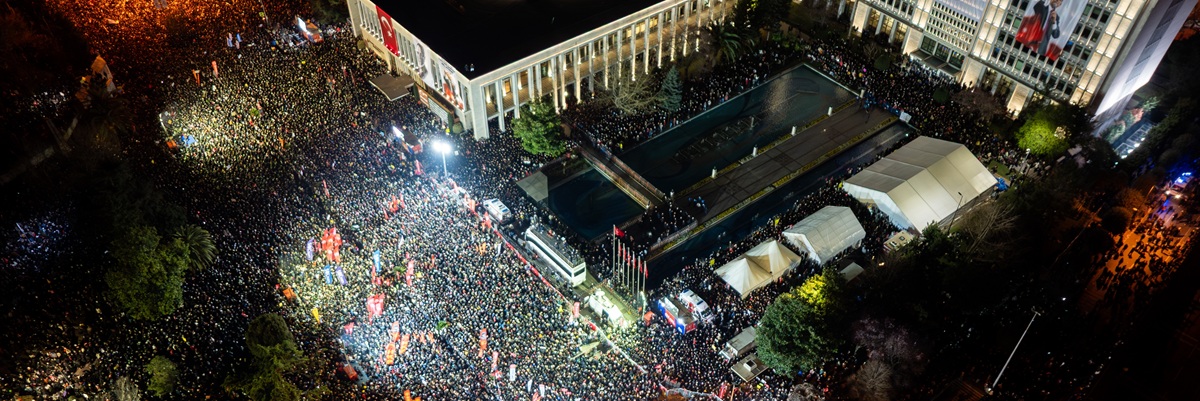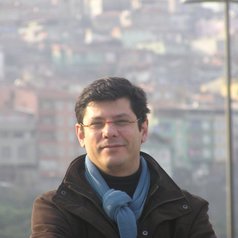Defense & Security
Turkey: four key concepts to understand the current turmoil

Image Source : Shutterstock
Subscribe to our weekly newsletters for free
If you want to subscribe to World & New World Newsletter, please enter
your e-mail
Defense & Security

Image Source : Shutterstock
First Published in: Mar.25,2025
Apr.07, 2025
To better understand the current situation in Turkey, where massive demonstrations have been taking place non-stop since the arrest of Istanbul mayor Ekrem Imamoglu on March 19, we need to take a look at some Turkish words - with no real French translation - that have made their appearance, or reappearance, in the public sphere, and which reflect the rewriting of political rules that President Recep Tayyip Erdogan's government is currently enforcing.
Arrested on March 19, along with dozens of his partners, elected representatives and members of the Republican People's Party (CHP, Kemalist), on charges of “corruption”, “terrorism” and “helping the Kurdistan Workers' Party (PKK)”, Istanbul mayor Ekrem Imamoglu, 53, elected in 2019 and re-elected in 2024, was stripped of his mandates and imprisoned on March 23.
The authorities have also set about challenging his academic credentials, since, according to the Constitution, the President of the Republic must be a university graduate. However, Imamoglu's university degree, obtained 32 years ago at Istanbul University, has just been cancelled under pressure from the authorities. Ironically, Recep Tayyip Erdogan himself is suspected of not having actually obtained the university degree he claims to have, and cannot produce any proof of university attendance (photos, testimonials, etc.), even though the university from which he claims to have graduated asserts that he was indeed a student there.
This brutal dismissal of a key political figure in Turkey, who appealed to both the secular electorate and conservative circles, and who was expected to be the opposition candidate against Erdogan in the 2028 presidential election, immediately sparked a widespread reaction. For the past week, the country has been swept by a wave of huge demonstrations, bringing together hundreds of thousands of people expressing their solidarity with the imprisoned leader. They range from young people and academics to citizens from towns traditionally loyal to the AKP. While the mainstream media remain strangely silent, and X has already blocked numerous opposition accounts at Ankara's request, figures put forward by the CHP General Secretary put the number of demonstrators at one million.
Against this explosive backdrop, it's worth taking a closer look at some of the specific terms used in current Turkish public debate, which reflect the current situation in a country in turmoil.
The “secret witness” (Gizli tanık)
First term: Gizli tanık, French for “secret witness”. In Turkey, the use of “secret witnesses” was legalized by Law no. 5726 on Witness Protection, adopted on December 27, 2007 and published in the Official Gazette on January 5, 2008, at a time when the Gülenist movement dominated the judiciary in agreement with the ruling AKP.
This system of Gizli tanık prevents the cross-examination of witnesses and facilitates the pre-trial detention, and subsequent conviction, of all suspects in political cases: all it takes is for a secret witness to testify against them.
This practice was first introduced in 2007 in the Ergenekon trials. It was subsequently used against Kurds in the Kurdistan Communities Union (KCK) trials in 2009. It continues to be used in various court cases today. It was this “secret witness” that was used by the authorities to bring charges of corruption and terrorism against Imamoglu.
Mayors dismissed and replaced by power-appointed administrators (Kayyum)
Our second term, kayyum, refers to the crucial figure of the “guardian”. In Turkey, it refers to a person appointed by a court or civil authority to manage property, particularly real estate, or an institution. This measure comes into play when the head of an institution is unable to perform his or her duties or is removed from office for reasons defined by law.
The application of kayyum appointments to municipalities in Turkey was legalized by decree-law no. 674, published on September 1, 2016, during the state of emergency instituted after the attempted putsch of July 15, 2016. This decree gave the Ministry of the Interior the power to remove mayors accused of being linked to terrorist organizations and appoint administrators in their place.
Following the adoption of this regulation, many municipalities, particularly those run by the pro-Kurdish HDP party, were placed under administrative guardianship. Since 2016, a total of 160 kayyum appointments have been made.
Among the charges against Imamoglu is the existence of an electoral agreement, dubbed the “Urban Pact”, concluded with the HDP ahead of the 2024 municipal elections. Paradoxically, this accusation comes at a time when the government is conducting behind-the-scenes negotiations with Abdullah Öcalan, the historic leader of the PKK, with a view to disarming the Kurdish movement.
At dawn on March 23, 2025, the judge ordered that Ekrem Imamoglu be remanded in custody on the charge of “corruption”, while the charge of “terrorism”, the only one that would allow the appointment of a kayyum in Istanbul, remained under discussion.
Gezi Park: reminiscences of the 2013 mobilization
Our third term is Gezi, which literally means “promenade”. It refers to a park in the heart of Istanbul, adjacent to Taksim Square, a mecca for political mobilization.
The “Gezi movement” refers to a wave of protest that erupted in Turkey in May 2013 following an urban redevelopment project threatening this park, one of the few green spaces in central Istanbul. Initially led by environmentalists, the mobilization quickly turned into a vast protest movement against the government of Recep Tayyip Erdogan, accused of authoritarianism and increasing interference in public life, with the desire to demolish the park being equated with a desire to deprive the opposition of a traditional gathering place.
The protest was violently repressed by the police, and Gezi became a symbol of democratic resistance in Turkey, marking a lasting rift between the authorities and a section of civil society.
The current protests are reminiscent of this movement in certain respects, but this time the motivation is strictly political. The aim is to denounce, above all, the manipulation of democratic rules by those in power.
The participation or otherwise of Kurdish circles in these events is not insignificant. Whereas in 2013, Kurds only mobilized individually, in the context of the peace process with the AKP, today, the pro-Kurdish DEM party (which replaced the HDP in 2023), could officially lend its support to the pro-Imamoglu rallies. With its former leader Selahattin Demirtas, behind bars since 2016, sentenced last year to 42 years in prison, and Öcalan himself recently calling for the PKK's self-dissolution, DEM's position is being closely scrutinized.
If the Kurds, in an organized way, join the protests in favor of Ekrem Imamoglu, the new movement has a chance of succeeding. On the other hand, if, as in Gezi, Kurdish political organizations - first and foremost the DWS and PKK - are reluctant to interfere with the ongoing peace process with Ankara, then the disorganized youth will once again find themselves helpless in the face of tear gas. Of course, it's up to the CHP to lead the movement. But the militant experience of the Kurdish movement far exceeds that of the middle-class youth who support the CHP; too individualistic, insufficiently committed, these citizens have much to learn in terms of mobilization from the Kurds, who have been fighting for decades.
Bad loser (Mızıkçılık)
Translation: “Refusing defeat, changing the rules during the game and using bad faith to consolidate power.” In plain English, it's the sore loser who doesn't accept defeat even before being defeated! This term is widely used by demonstrators to refer to the AKP's behavior - behavior reminiscent of that of the same party almost ten years ago.
After the June 2015 parliamentary elections in Turkey, the AKP had lost its absolute majority, but violence provoked by both the PKK and military forces, notably linked to the Kurdish question, had disrupted the political process. This situation had created a climate of insecurity and instability, leading to early elections in November 2015; these would enable the AKP to regain an absolute majority, strengthening Recep Tayyip Erdogan's position.
Today, this tactic can be applied again to remove a potential opponent before the next elections. A new element has been added to this complex picture: the solidarity with Imamoglu shown by many Western mayors, who publicly denounce the attack on democratic principles and respect for the rule of law in Turkey.
But could this support be manipulated by the Turkish government for propaganda purposes? In a climate where every gesture of international support is scrutinized, it is clear that this solidarity could be misused to reinforce the image of an isolated country, or to distract attention from the real domestic issues at stake.
Ultimately, the situation in Turkey remains extremely fragile. In Istanbul, a metropolis of over 15 million inhabitants, the gamble of neutralizing a political opponent of this caliber entails considerable risks, especially in a context where youth and academics are mobilizing with vigor.
Marked by unpredictable reversals, Turkey's trajectory leaves open the possibility that popular resistance will eventually force the government to back down, allowing Imamoglu to retain a promising political future beyond his current goals. But we said the same for Selahattin Demitas, who has been in prison for almost... ten years.
First published in :

Historian and political scientist, research professor at the University of Strasbourg and the CNRS.
Unlock articles by signing up or logging in.
Become a member for unrestricted reading!